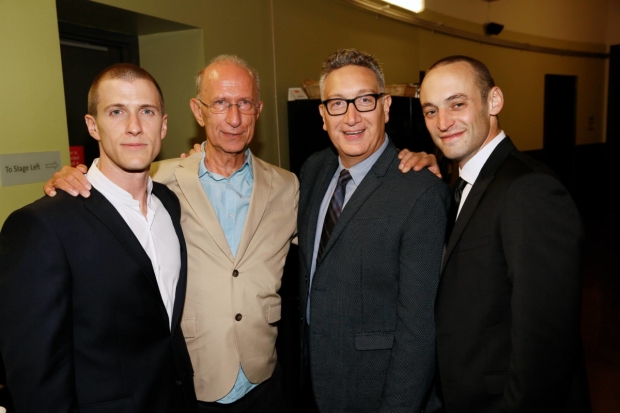Playwright Martin Sherman Looks Back at His Landmark Drama Bent
The work, which explores the plight of homosexuals during the Holocaust, is now receiving a major new revival in Los Angeles.
It's safe to say Martin Sherman never expected his play Bent to make history. Following an illicit relationship between homosexual men incarcerated at the work camp Dachau in the midst of the Holocaust, Bent, which premiered in 1979 and was originally written with a "little fringe theater" in mind, subsequently became one of the most important dramas in the LGBT canon.
Yet for a work that broke new ground (scholarship on the subject matter wasn't even a thing when Sherman sat down to write), it's only now receiving its first-ever major revival, at the hands of famed director Moisés Kaufman (The Laramie Project) and the Los Angeles-based Center Theatre Group. Running at the Mark Taper Forum through August 23, this Bent features a cast made up of Patrick Heusinger, Charlie Hofheimer, and Andy Mientus — along with Jake Shears, front man of the band Scissor Sisters, in his acting debut.
For Sherman, it's a "particularly nice" experience. Prior to a recent performance, he sat down with TheaterMania to discuss what inspired him to write Bent, how he developed the sexually charged nature of the script, and why seeing it performed in different languages is like a "Rorschach Test."

(© Ryan Miller/Capture Imaging)
What made you decide, all those years ago, to write a play about the persecution of homosexuals during the Holocaust?
I stumbled upon a little bit of information about what happened to gays in Nazi Germany, which nobody knew about. There was a law in Germany that had been on the books for years, outlawing homosexuality, and no one paid attention to it. When the Nazis came in, they just implemented it. That's how it started.
I thought the play was only going to be done in a little fringe theater. I didn't think it was going to allow people to know about it. I was working with an organization in London called the Gay Sweatshop, which was a pioneering organization that was trying to create gay theater at a time when there was none. Originally, in my mind, I was writing it for them.
How did they react to the work?
I sent it to the man who ran the Gay Sweatshop. He knew I was writing it for them, and he was a great person. He wrote back and said, "We can't do this.…It has to go into the world." [It was] the most generous thing anyone has ever done for me.

(© Craig Schwartz)
When you're writing a fact-based play like this, where do you even begin? How much scholarship was there about the subject matter in the 1970s?
There was no scholarship that saw the light of day when I wrote the play. After I wrote the play, the scholarship either began or found light. There was a book [The Pink Triangle] that was written by a man named Richard Plant. He couldn't find a publisher, but there was a slight excerpt from it in a magazine called Christopher Street, which was very helpful to me when I was writing the play. In a sense, the favor was returned when the play was produced, because he was able to get the book published.
After the war, the Allies threw out all of the Nazi laws. They kept all of the old German laws, so they kept the paragraph that outlawed homosexuality. Anybody who had been in the camp as a gay man couldn't say why, or legally, he could be thrown into prison. Had they talked about it, it probably wouldn't have been printed anyhow. Most of the people who had been prisoners died without being able to recount their experience. It wasn't rescinded until many, many years later.
One of the most famous scenes in Bent features prisoners Max and Horst bringing each other to orgasm without touching, while on a work break at Dachau. What was your inspiration for that scene?
There was a book that was very helpful to me by Bruno Bettelheim called The Informed Heart. He was a Freudian psychiatrist who was imprisoned in Dachau and then released two years later. To keep his sanity, he took mental notes of the psychological behavior of the prisoners and guards. One of the things he talked about was the way the guards made the prisoners lose their identity. The biggest way to lose your identity was to be stripped of your sexuality, which usually just disappeared in the camp. If someone could find a way of retaining their sexuality, they had a chance to keep their personhood. That led me to this scene. It really was a way of staying alive and maintaining some sense of who you are. The play, to some degree, is about identity.

(© MGM/Craig Schwartz)
In this production, the role of Greta, a Berlin drag performer, is played by Jake Shears of the band Scissor Sisters. In the film version, Mick Jagger played Greta. Did you create this character with rock stars in mind?
I wrote it thinking of rock stars. In those days, rock stars like Mick Jagger and Rod Stewart and Davie Bowie, who were predominantly heterosexual, used gay imagery for their own image. When we were making the film [in 1997], the director, Sean Mathias, said to me "Who should play Greta?" and I said "I've always wanted Mick Jagger." He contacted Mick Jagger. Mick Jagger said yes. It was the easiest casting he's ever done. It's great that Jake is doing it. I love the Scissor Sisters. He's very good. He should do more acting.
How often do you go see various productions of Bent?
I've seen it a lot. I haven't seen it in English in a while. I haven't seen it in America for a very, very long time. It's been done in sixty countries, which is an enormous amount. Recently, we've added some countries that I never thought would do it. It was done in Turkey, which is the first Islamic country, and I'm sure the only Islamic country that would do it. It was done in South Korea and Hong Kong. It's like a Rorschach Test of the country. You learn a lot about [that] country, about the rhythm and personality [of] the country. And you know what's happening because you know the rhythm of the play. It's really intriguing.

(© Craig Schwartz)








